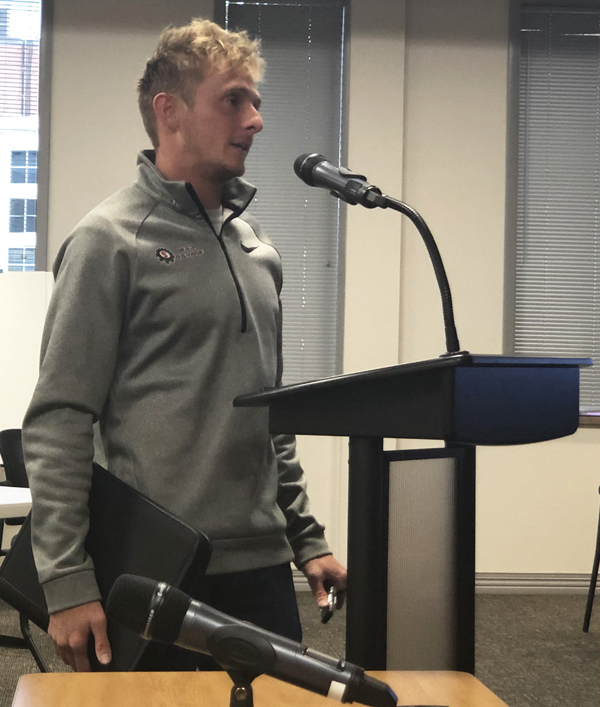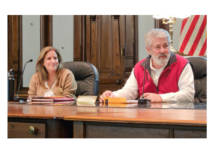After approving a use variance for auto sales on North Detroit Street, the Warsaw Board of Zoning Appeals Monday denied another one for a home occupation on Highlander Drive.
Jordan Greenberg sought a use variance to allow auto sales in an Industrial-2 zoning at 2249 N. Detroit St., Warsaw. The property is surrounded by I-2 to the north, east and west but Commercial-2 to the south.
According to City Assistant Planner Jonny Latsko, auto sales are not permitted in an I-2. There is an auto sales lot down the road in an I-2 at 2775 N. Detroit St. A use variance to allow retail sales in an I-2 was allowed for this site in 2006. Previous sign permits show in 1998 that this lot was used for auto sales previously, he said.
“As for the recommendation, considering the location, history of the site and surrounding land uses, it is the recommendation of the planning department that the board approve this request,” Latsko said.
No letters remonstrating against the petition were received by the city planning department.
BZA Vice President Rick Keeven said the building previously was occupied by Mohawk Carpet Sales and the property has been used for commercial for years. Dan Smith, BZA member, agreed.
Greenberg said he wants to sell cars on the property and will use the building already there.
With no remonstrators, Smith made a motion to approve Greenberg’s petition, Jeff Johnson provided the second and it was approved 4-0.
For the second petition before the Warsaw BZA, Vani Kasireddy sought a use variance to allow a home occupation in a Residential-1 zoning district at 2332 Highlander Drive, Warsaw. The property is surrounded by R-1 in every direction.
R-1 is the most restrictive residential zoning district, intended only for low-density single-family residential development, according to Latsko.
The proposed business is an eyebrow service. The petitioner plans to have five to six customers per day Monday through Wednesday and six to eight Friday through Saturday, according to Latsko. The business would operate during normal business hours. Customers would come one at a time by appointment only and would park in the driveway.
There are now no commercial properties in the subdivision, nor does the road act as a primary thoroughfare for nearby commercial businesses, Latsko said. The subdivision has a restriction disallowing any commerce or trade on the lots, “although this is not legally binding for city purposes,” he said.
The planning department received two letters against the approval of the request. Each letter cites concerns relating to the existing restrictions, as well as one which cites concerns with traffic, he said.
“While some instances of home occupation have been allowed for beauty salons in R-1 districts in the past, it is generally discouraged due to the nature of individuals coming to the home. Additionally, because there is no existing source of nonresidential traffic or commercial uses in the neighborhood, it is the opinion of the planning department that the board does not approve this request,” Latsko said.
One letter against the petition was from Dr. William Myers who is the adjacent property owner at 185 Mockingbird Lane. In part, his email stated, “There is so much construction and traffic currently and adding additional traffic is not what is in the best interest of current homeowners. Safety for all the children and families who walk the streets every day is paramount in your considerations.”
The other email against the petition came from Dale Custer, the owner of all remaining unsold lots in Eagle Crest. He owns about 15 lots, “of which this is one that I still own,” he wrote. He notes the restrictions he placed on the subdivision specifically prohibit home businesses.
Nagendra, speaking on behalf of his wife Vani Kasireddy, who owns the business, said they’re planning to have a property in Eagle Crest and want to run Vani’s business from home. He said they would only allow a customer to park in the driveway, there would be only one customer at a time and they wanted to obey the community guidelines.
Keeven asked if they had already bought the home or were considering buying it. Nagendra said they were considering buying the property but wanted to see how their petition for a variance went first.
“It’s a brilliant idea,” BZA President Tom Allen said. “Often, we get this after they bought the property and in an R-1, it’s very, very slim that we approve it.”
Nagendra said they want to stay in the community even if they don’t end up buying the Highlander property.
Keeven said though the BZA doesn’t have to consider the neighborhood restrictions, “however, looking at the neighborhood, and keeping that in mind, that is a very exclusive neighborhood.”
Personally, he said, if the neighbors don’t like it and have put a lot of money into their homes, he couldn’t discount that either.
Allen said he couldn’t recall a home business operating out of an R-1 district, though there may have been one that was right next to a commercial district. He said an R-1 was “very restrictive, very restrictive.”
Keeven made the motion to deny the petition and it was unanimously denied.





